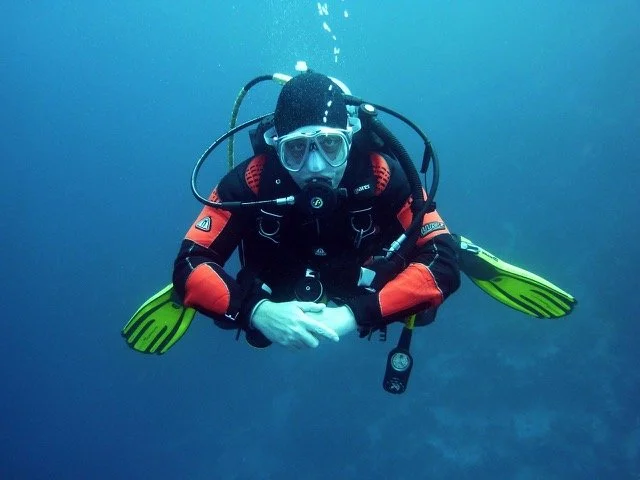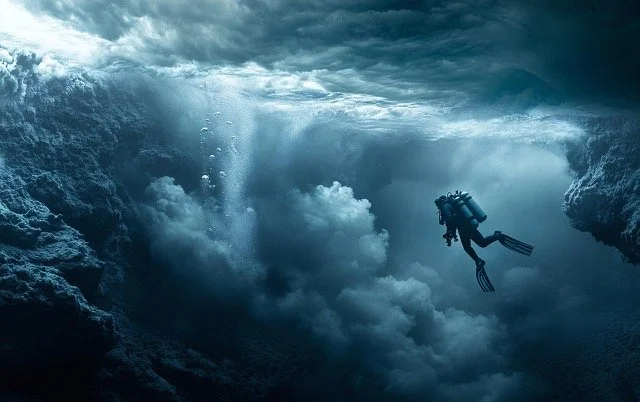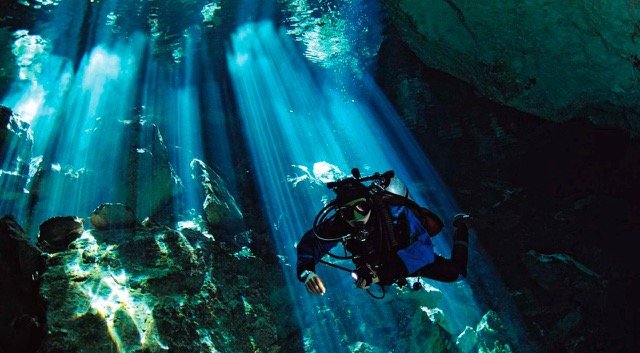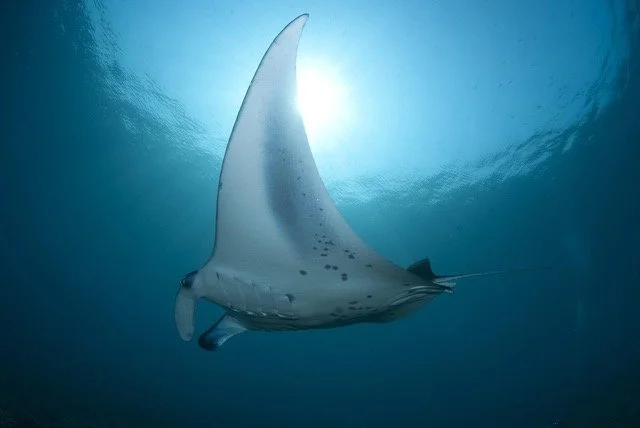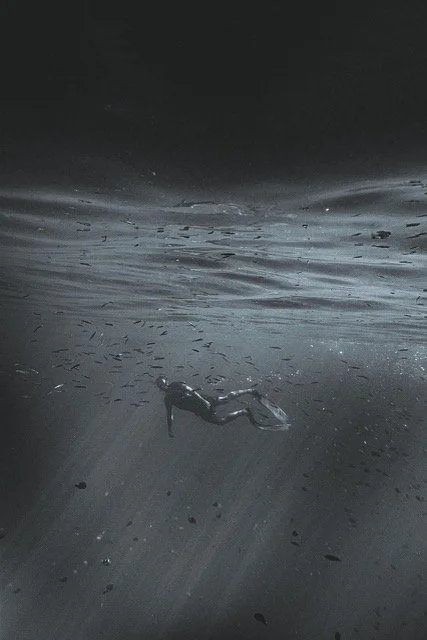Deep Diving: That Time I Almost Killed my Ex-Wife
It’s been decades now since we jumped off that tiny charter boat into the coal-black waters of the Great Barrier Reef. It was our first-ever night dive and we slipped silently beneath the surface, cocooned in full-body wetsuits, the seawater so cold I shivered as warmth leached from my body.
Holding each other close to keep our bearings, both Betty Jean and I knew it was perilous to dive in such darkness, especially for two abject beginners. We soon floundered, gasping for breath, deep underwater on the other wide of the world.
As with the marriage itself, that dive was a leap of faith, made well before we knew how to respond when things went wrong. We were not only novice divers but hapless neophytes as to what it meant to nurture a long-term bond.
We survived that misadventure, if barely, but not our troubled marriage. Looking back, I can see now how a brash decision I made in those murky Southern Hemisphere waters would later return to torment me.
That dive was a mayday call for a relationship already threatened, a sign I blindly chose to ignore.
Our friends called us The Lockhorns, after the 1980s comic strip about a bickering middle-aged suburban couple. But we were young urbanites, not yet in our forties. So where did all the squabbling and the tension come from?
We fought over everything. She wanted children; I cringed at the idea. In my mind, I was just too cool to be married. Yet Betty Jean had won me over with her southern twang and tight blue jeans that turned heads, a feisty bad-girl I found totally enticing. As a cheerleader for the Chesapeake High School football team, she led her team in a racy chant when they played their crosstown rivals in Norfolk: “We don’t drink! We don’t smoke! Nawfuk! Nawfuk!” Before I met her, she dated a guy associated with organized crime.
Betty Jean cracked me up. I can still recall the day I was barking orders during a backyard project in our rented house in San Diego. She looked up, garden hoe in hand, insisting that I couldn’t tell her what to do. In that delicious Virginian accent she declared, “You ain’t my supavisah!”
Still, we traveled well together. And the Great Barrier Reef had always headed our bucket list, even though we didn’t know the first thing about deep sea scuba diving.
The trip would be a hoot. We’d visit Sydney and Melbourne, fly to Alice Springs in the fabled Australian Outback. We’d visit Aboriginal reservations in the rainforest on the Cape York Peninsula and spend a few days diving in the Coral Sea.
At home, we took evening classes to earn our PADI certification card offered by the Professional Association of Diving Instructors to prepare us for the adventure and prove to equipment rental outfits that we were certified as open-water divers.
We turned our lessons into a comedy of errors. Betty Jean once donned her air tank apparatus upside-down and thrashed helplessly in the deep-end of a community pool, prompting our instructor, a German guy named Walter, to yell “Oh no!” and dive in after her. For my part, I couldn’t figure out to regulate my breathing and sucked all the air out of my tank long before anybody else in the class.
In our last exercise, we dove in local kelp beds, a lush forest of greenery off the La Jolla shores, as confusing to navigate as an Indiana cornfield. Through it all, Walter trailed us like a nervous chaperone at a high school dance. He wasn’t taking any chances with his two class screwups.
Still, we got our licenses and laughed off our difficulties. No bogus certification was going to stop us from another adventure!
In the coastal town of Cairns, we signed on with a small charter ran by two Australian adventure junkies, Mick and Leonard. We joined six Japanese divers for a 12-hour cruise that featured several dives, including one after dark. On the trip out, I told off-color jokes because it was somehow important to me to establish myself among these two bearded Aussie surfer-types, as a raconteur, an outspoken Yank with a hipster sense of humor.
We arrived at an isolated section of reef, small and rounded like the back of a turtle shell. The water beneath the boat was crystal clear, about 50 feet deep. The Japanese divers quickly dove into the water, bolting toward the reef with their expensive underwater cameras in hand.
Betty Jean and I held back, tentative. Unlike snorkeling, floating on the surface, where you can pop up for a gasp of air the moment you feel panic, we knew that trouble lurked further below in a place where the airy atmosphere above couldn’t reach you.
We took the plunge and hovered together at the surface, two dots floating amid a vast unknown universe. On this low-budget charter, neither of the Aussies jumped in with us to ease our fears — the mates just hustled us into the water with promises of cold beer once we got back.
We were on our own. Where the hell was Walter when we needed him most?
The reef was colored in reds and purples, the surrounding warm waters a rich royal blue. But in the near distance, the palate quickly turned to gray and then went to black, like deep space. The no-go zone, where dragons lurked. I shuddered to think of the life forms that could emerge from the blackness.
Yet in the warm sun, the reef was a children’s playground. Colorful clownfish, groupers and parrotfish skirted past, just out of reach. I saw an angelfish, the kind I used to keep in my aquarium as a boy, but this one was as big as the family dog.
Suddenly, one of the Japanese drivers bolted from the reef, camera pointed, pursuing a manta ray that had emerged from the murky beyond, gliding gracefully through the water, slowly moving its wings like a bird in flight. The creature spotted the pursuing diver and changed course, heading straight toward me. As it passed, so close I could have run my hands along its body, it banked to one side and our eyes met, before it moved off to disappear back into the abyss.
The sight was breathtaking, literally for me. Long before any other divers, I had to return to the boat. I had already sucked down all my air. My tank was empty.
If day diving is like visiting a nearby planet, night plunges are like traveling to the complete unknown of a distant galaxy. Betty Jean and I stood frozen at the top of the ladder on the charter boat. The Japanese divers had already plunged into the rayless water, each bearing a flashing identifier beacon on their tanks that grew smaller the farther they submerged.
We watched them go, too paralyzed to follow. We’d never been in water at night before. But the Australians shooed us into the water. “You’ll be fine,” they crooned. “The beers are cold for when you get back.”
We eased down the ladder, our diving fins lending us the awkwardness of fish flopping onshore. Once in the water, suspended in total blackness, Betty Jean clutched at me like a barnacle, her gloved hands squeezing into my arm until it hurt.
I switched on my underwater flashlight, which at that moment felt as comforting and necessary as the air tank on my back. The same turtle reef where we had dived earlier that day now seemed ominous, a dark fortress. We followed the beacons of the Japanese divers pulsing like fireflies on an airless summer night.
Finally, after a few leg kicks, I grasped onto the jagged reef and shined my beam directly into nooks and crevices where a universe of sea creatures make their homes. Nighttime is feeding time and the ocean is vividly alive. We moved slowly along the reef, putting hand over hand, never losing our grasp as we pointed our light and flinched what emerged to greet us.
Octopuses and sea snakes slithered past. Moray eels popped their heads out of crevices, mouths open, as though attacking the light. Larger predators lurked further off in the dark. At one point, I switched off my flashlight to reveal the kind of complete blackness I had never before experienced. This is what death must be like, I thought. Not for the faint of heart, night diving is alike watching a three-dimensional horror movie featuring an otherworldly cast of characters. Betty Jean’s wrestler grip of my arm tightened.
With all my senses competing for my attention, I was sucking hard on my oxygen supply and my gauge quickly dropped into the red zone. It was time to go back to the boat. I turned and located the large flashing red beacon that indicated the bottom rung of the ladder.
As we grasped the ladder, still submerged, I glanced at my dive watch, which tracks your time underwater. It read 29 minutes, my shortest dive yet. In my naive arrogance, I told myself that 30 minutes would look better on my dive chart.
I motioned to Betty Jean, pointing to my watch and holding up one finger: I was staying here for one more minute, I tried to say. She didn’t understand. We were right at the boat. What the hell was I doing? She raised both hands in frustrated alarm.
As we bickered in pantomime, something unnerving happened. We both wore BCD (buoyancy control device) belts that, if adjusted properly, would keep us floating in place without even having to wave our hands or flick our fins.
But we hadn’t bothered to check our belts and quickly experienced what divers call “losing buoyancy awareness.” In the absolute dark, with little or no visual references, we drifted downward in a slow uncontrolled descent, like fall leaves dropping from a tree on a moonless night.
Suddenly, my light captured puffs of rising dust. Somehow, we had fallen until we reached the sea floor. Betty Jean watched me dumfounded, her eyes wide, like I was a predator moving in for the kill.
I took a long draw of air which still failed to fill my lungs, like a shortened breath of a longtime smoker. I was terrified. I waved both hands at Betty Jean and then pointed up, as if to say “I’m outta here!” Then I kicked hard toward the surface, sucking hard on my oxygen mouthpiece.
I popped out of the water like I was waking from some nightmare. Gasping, flailing my arms, unable to get my bearings, the water’s surface and night sky having fused into a single, horizonless unbroken thing. Then Betty Jean burst out next to me, emitting a primal scream that had probably started even before she reached the surface.
“You bastard, you fucking bastard, you almost killed us!” She yelled again and again, until she began to cry. The Australians rushed to the side of the boat, their faces grim, knowing that whatever had happened down there, it was not good. Later, I told no more jokes and just slouched watched in silence the entire way back to port.
We flew home t he next day. She filed for divorce a few years later. I haven’t scuba-dived since.
